The House at Allen Cove | E.B. White House Tour
E.B. White wrote some of the most enduring words in American literature from this farm in Brooklin, Maine.
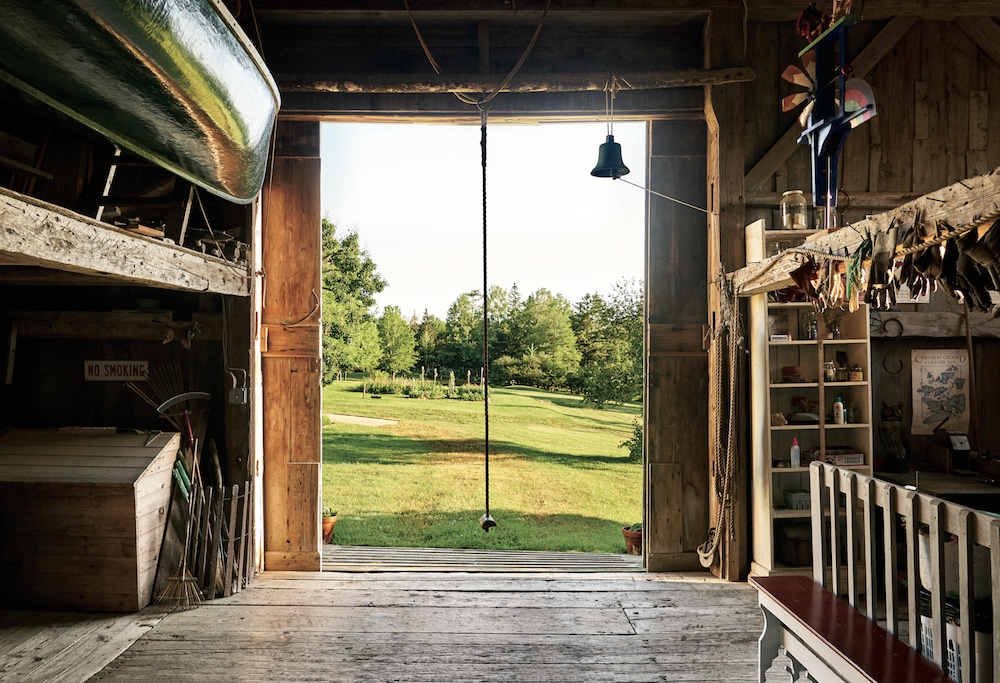
Coffee By Design | Portland, Maine
Photo Credit : Katherine KeenanEDITOR’S NOTE: “The House at Allen Cove” originally appeared in the September/October 2017 issue and soon became the most-viewed “House for Sale” story in Yankee’s history. Listed at $3.7 million, the property formerly owned by Charlotte’s Web author E.B. White was subsequently sold and is currently off the market. But the article still gives an unforgettable look behind the scenes at a momentous New England property, as Yankee editor Mel Allen tours the Maine farm where White lived until his death in 1985. For more on E.B. White and his beloved farm, we’re also reviving the 1986 remembrance “A Neighbor’s Farewell,” written for Yankee by the author’s longtime neighbor Roy Barrette.
* * * *
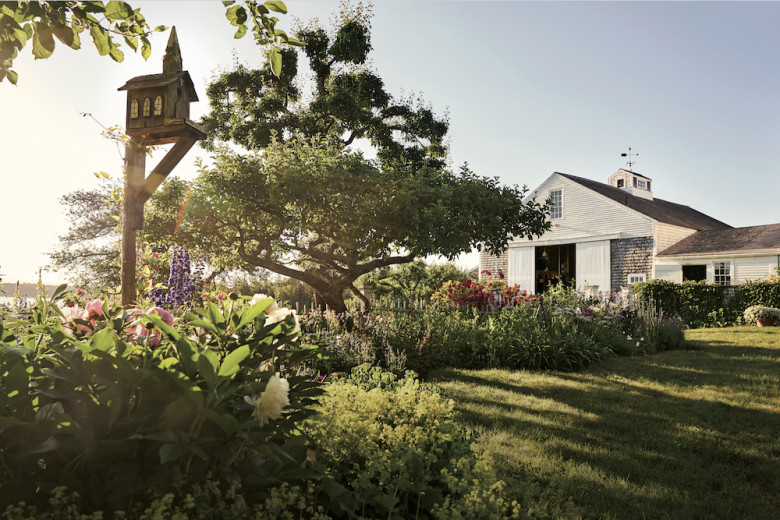
Photo Credit : Mark Fleming
The swing still hangs by the barn doorway. There may or may not be a spider spinning her web in the darker corners of the rafters on this early July afternoon in North Brooklin, Maine. Allen Cove, a small inlet in Blue Hill Bay, sparkles in the sunlight. There are gardens of flowers so beautiful that the eye goes to them even before settling on the sturdy white clapboard farmhouse that has stood here for more than 200 years.
I knock on the farmhouse door. No answer except for the bark of a dog. A man who I soon learn has been the caretaker here for over 15 years is working in a shed by the barn and calls out, “Just walk on in, they know you’re coming.”
Robert Gallant is waiting inside, and I follow him to a breezy sunlit room that looks out on a patio, gardens, a pond, and a sweeping view of the bay and the distant mountains of Acadia National Park. He and his wife, Mary, have been married nearly 60 years, and for more than half of those years they have traveled from their South Carolina home to spend summer and fall on their 44-acre saltwater farm, one of the loveliest and best preserved in Maine.
They arrived here only a few days earlier, and Robert greets me in a voice with the slow, easy inflection of the deep South. He’s led a vigorous life, with a highly successful business career as a managing partner of the Gallant-Belk department store chain and a property developer. But he’s on the back end of his eighties now, and lately he’s had a rough go of it. His right wrist is heavily wrapped after a recent fall, and he’s reluctantly coming to terms with what he can and can’t do anymore. I learn all of this over the next few hours as I hear Robert’s and Mary’s stories, which speak to a deep love for everything my eyes can see—as well as those things that undoubtedly only theirs can. There is a bittersweet feel to our time together. It’s clear they do not want to leave. They know they should. It is time, they say, to downsize to one home and live closer to their four children and seven grandchildren, who remain in the Carolinas.
Mary enters the room. Within moments she connects the threads of their story with those of the previous owners, E.B. and Katharine White, who bought the farm in 1933 and moved here full-time four years later. Katharine died in 1977, her husband in 1985. “I’m sure you want to do the Charlotte’s Web thing,” Mary says, and quickly ushers me to the barn and sheds that once housed the Whites’ hay, sheep, geese, chickens, pigs and (of course) spiders, and probably a rat or two. The barn itself also provided the setting for one of the most beloved children’s books of all time.
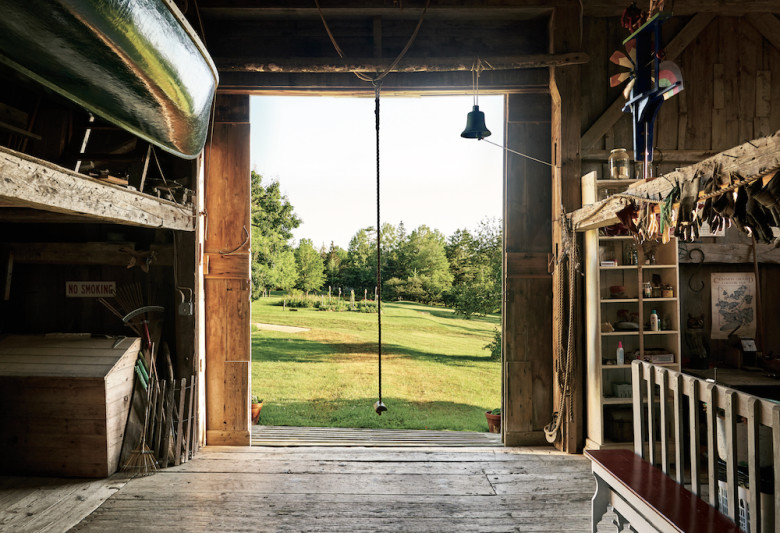
Photo Credit : Mark Fleming
We walk from room to room in what is possibly the most impressive and well-kept barn I have ever seen. There is that rope swing, immortalized in Charlotte’s Web as the one from which Fern and her brother launched themselves from the loft. Here’s where Wilbur’s trough would have been, Mary says, and “right here”—she points—“is the hole where I tell children Templeton the rat would scurry back and forth.” Light pours into the barn from massive windows the Gallants found in a salvage yard. “We think we have changed the barn for the best,” she says. Many of the improvements, she notes, had to do with “opening rooms up to more light.”
Every spring, Mary would arrive to open the house and ready the gardens for planting. For many years, in mid-June, a teacher from a school 90 miles away would bring her class to visit. “They sit on hay bales in the barn,” Mary says, “and we play the recording of Mr. White reading Charlotte’s Web. They swing on the same rope swing that they knew Fern had; they sit on the milking stool where Fern had sat. I wanted them to grow up remembering this day. I hoped one day they’d want to find Mr. White’s other writings.”
The tour of the barn and its sheds reveals a river of belongings flowing from one family to another—a collection of worn work gloves, an icebox from the Whites’ New York apartment, and also pieces the Gallants picked up as they canvassed flea markets and antiques shops. “I’ve been here all these years and I keep finding things,” Mary says, showing me a newly discovered stack of empty grain sacks.
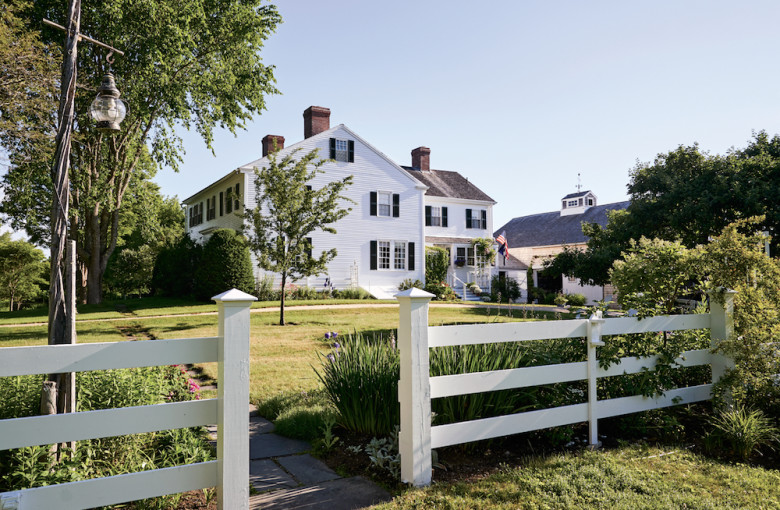
Photo Credit : Mark Fleming
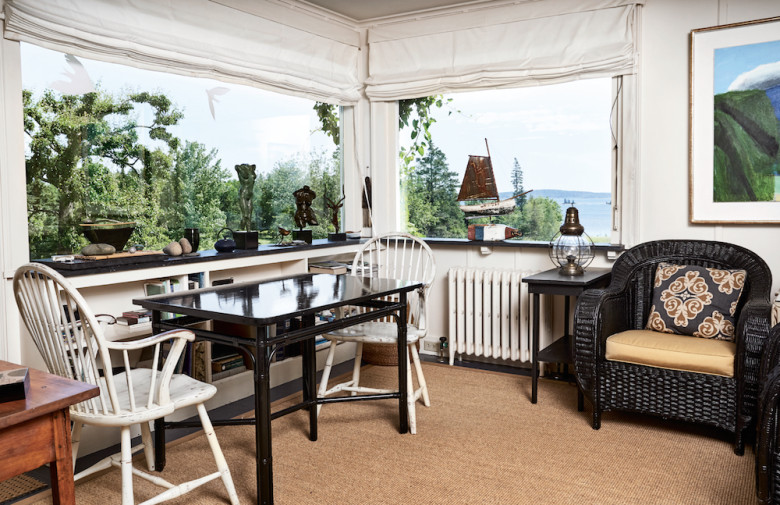
Photo Credit : Mark Fleming
We go back into the house, where the tour continues. There is much to take in: 12 rooms, six working fireplaces, three and a half bathrooms, 19th-century stenciling on the stairway walls, a wood cookstove in the kitchen. Here is the sunny study used by Katharine White, a revered New Yorker editor and avid gardener, now an office for Mary. Next we look in on the darker, north-facing office that belonged to E.B. White, now Robert’s. Upstairs, Mary opens the door to a bedroom that was once heated in winter by a small woodstove set into a fireplace. “This was Mr. White’s room,” she says. “He was afraid of fire,” and she points to the rope ladder squeezed into a corner of the closet.
After the tour, we rejoin Robert in a room that was formerly the old woodshed. They floored it and shined it up, and it’s become their summer sitting room, where the breeze flows through open doors and a day can slide by as you simply look out to the sea and mountains. They take turns telling me how they found this farm—a story Robert clearly relishes.
In 1939, his family came to the Maine woods. “Can you imagine how happy a 10-year-old boy could be sleeping in a log cabin?” he says. “I woke up to the smell of my mother frying bacon. The memory stayed with me.” He had always loved sailing, and “Maine has the finest sailing in the world. I wanted to have a sailboat in Maine.” In the early 1980s, he flew to Bangor, rented a car, and gave himself 10 days to find a place to put that sailboat. “The woman at the rental counter told me, ‘Don’t go lower than Bucksport,’” he says. “‘Lower than that is too close to Boston.’” Off he drove, and eventually he found his way to the Blue Hill Peninsula. “I said to Mary, ‘We have to go up there.’”
And two years later, that’s what they did. It was Mary’s first time in New England, and they found what she calls “the perfect spot,” a cottage on 12 acres overlooking Eggemoggin Reach, famous among sailors. It was perfect, and they bought it—except now Robert had also seen the prettiest saltwater farm on the entire peninsula, the one owned by E.B. White. Months after White’s death, Robert learned that his son Joel was interested in selling it privately. They met on the farm. “I walked all over,” Robert says, “thinking like a developer, and I came up with a figure I was willing to pay. Joel quoted a price and it was almost the same, to the nickel. We shook hands. I took out a checkbook to leave a deposit. He said, ‘We don’t need that. We shook hands.’”
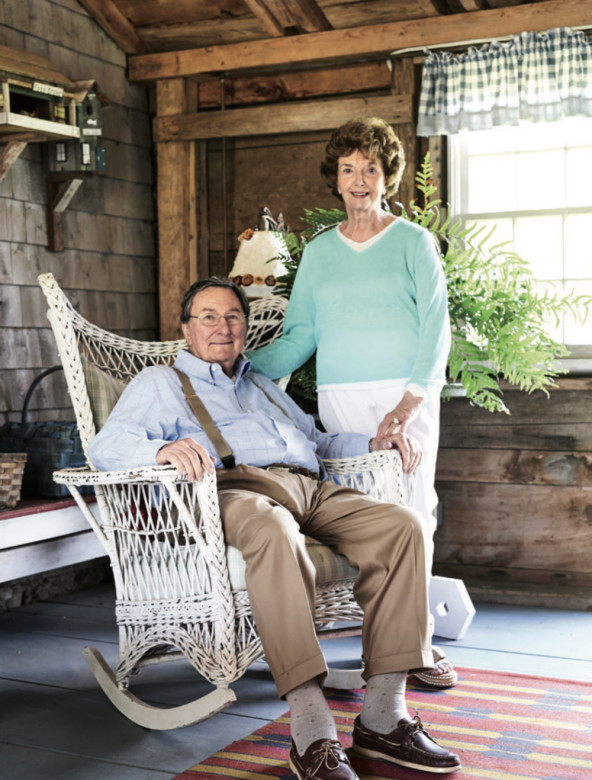
Photo Credit : Mark Fleming
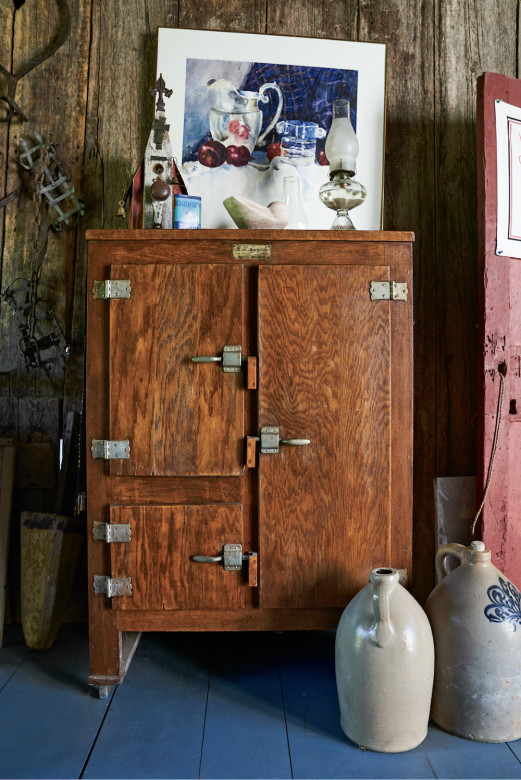
Photo Credit : Mark Fleming
“And now,” Mary says, smiling, “we suddenly had two houses on the Maine coast.” For the next few years, before they sold it, they rented out the cottage or loaned it to friends; in the meantime, they made the farm their own. Robert laid out an allée of trees that led like a magical pathway to the trim boathouse where, when the weather was right or there was too much going on in the house, E.B. White would retreat with his black Underwood typewriter. There he built a simple table and bench, placed a barrel for waste and an ashtray by his side, and with the sea breezes for company typed some of the most elegant and memorable sentences in the English language. For their part, the Gallants brought in some extra furniture and added fresh paint, helping to make the boathouse, like the entire farm, what E.B. White had wanted: a place for families to love.
The Gallants’ children grew up and brought their own children here, where they found a sturdy dock for launching boats and brave bodies into the chill water, and trees bursting with ripe peaches, pears, and apples. There were berry bushes, endless pasture to run through, clams to dig and fish to catch, evening campfire cookouts, and lazy days for reading.
And as the Gallants were putting down roots, they had a guide: Henry Allen, who had worked for the Whites for 37 years. “I said, ‘Henry, we will need someone to look after this place,’” Robert says. “Henry said, ‘I’ll stay on for 30 days. See if you like me, and I’ll see if I like you.’” Allen stayed on for seven more years before finally retiring in his late sixties. “Oh, it broke my heart when Henry left,” Mary says. “He was the spirit of this place. He was our connection to the personal side. Henry said people tried to encourage Mr. White to name the house, which he thought pretentious, but he said if he had to, he would call it ‘Two Big Chimneys and a Little One.’”
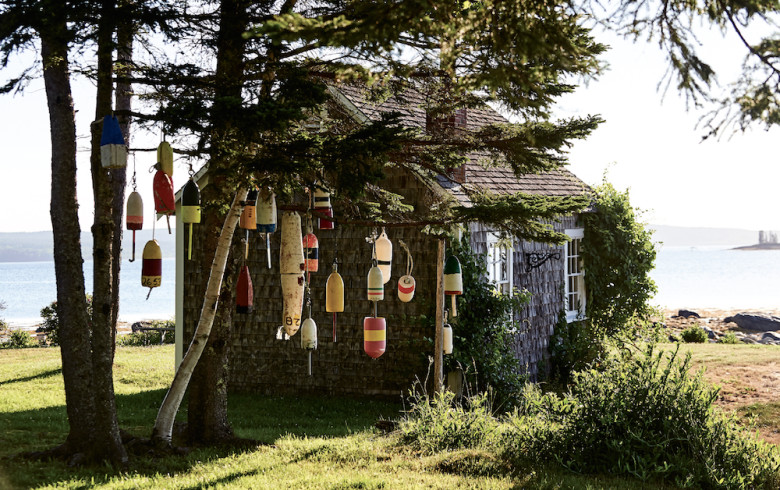
Photo Credit : Mark Fleming
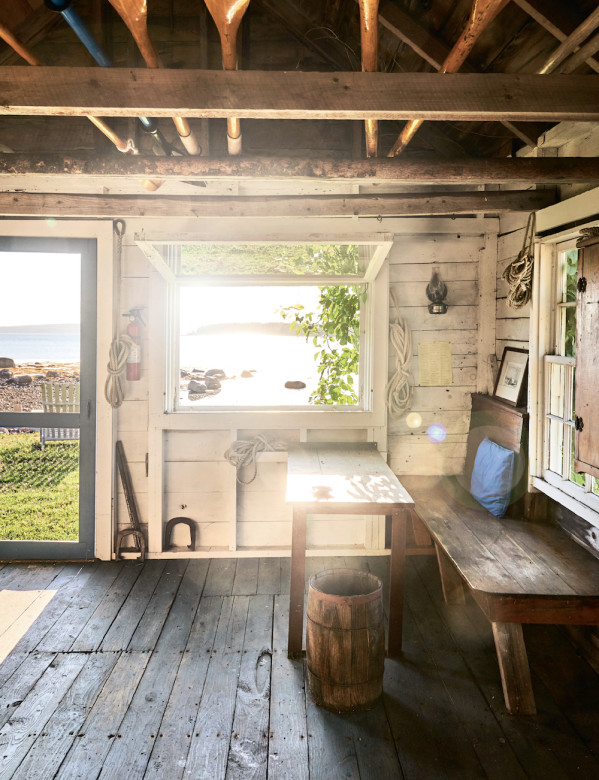
Photo Credit : Mark Fleming
Whoever comes after the Gallants will soon learn that E.B. White simply wanted to be left alone, to write and to farm and to be a member of the community. He did not want his home to become a shrine, a museum, a writers’ retreat; he wanted it to stay just a family home. His granddaughter Martha White, a staunch defender of her grandfather’s wishes, told me she believes the Gallants have made it their own, which is how it was meant to be. She hopes it will forever be that way.
“I feel I’ll always want to come back to Maine,” Mary says. “But I will miss just settling in, the way you do when it’s home.” Robert’s voice grows a bit huskier as he chimes in, “This house, this barn, this property is very dear to our hearts. These have been the best summers of our lives.” Mary says she will miss the sunrise over the cove, and the full moon rising “right there”—she gestures toward Harriman Point—adding, “You can read a book by its light.”
E.B. White never knew the Gallants, but he’d know what they’re feeling. He told one of the few interviewers whom he welcomed to the house, “This place doesn’t fit me since Katharine died. The only thing is, I really had to live here. Also, I love the place, and it’s my home.”
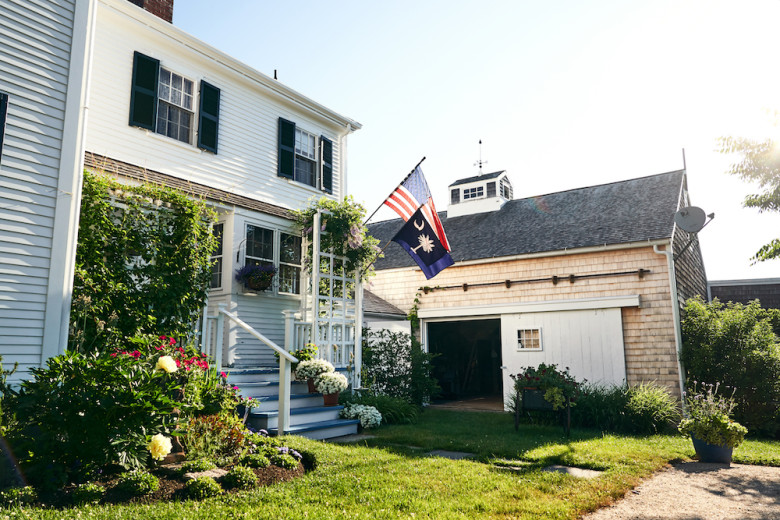
Photo Credit : Mark Fleming
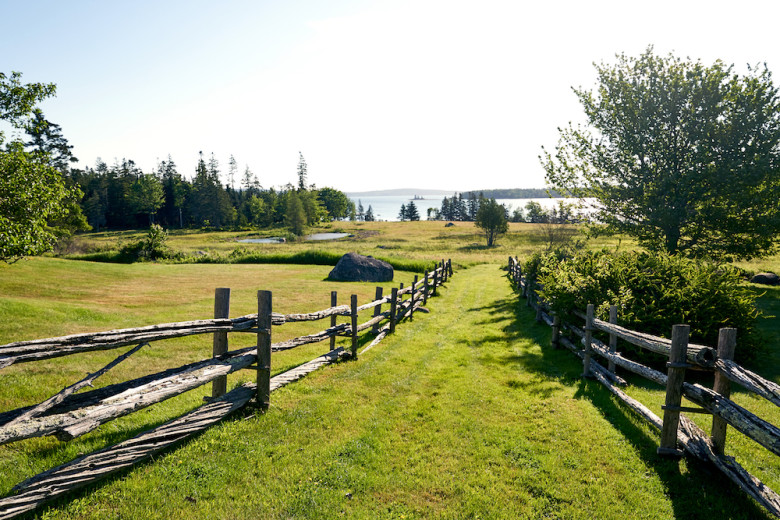
Photo Credit : Mark Fleming
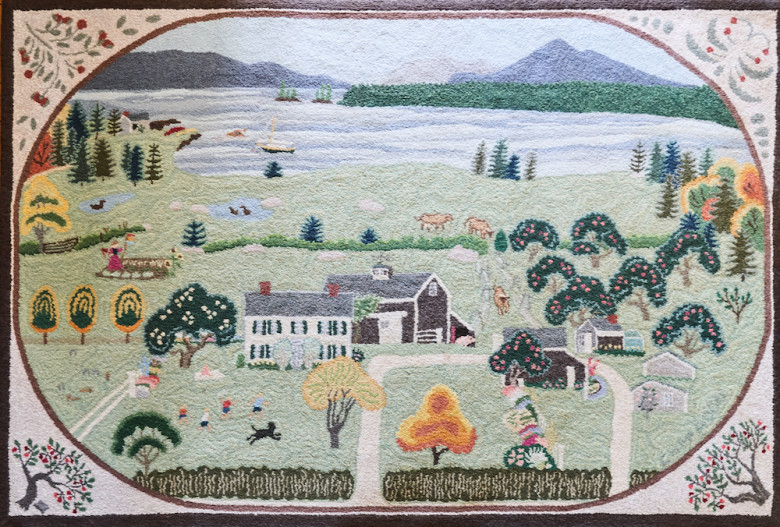
Photo Credit : Mark Fleming
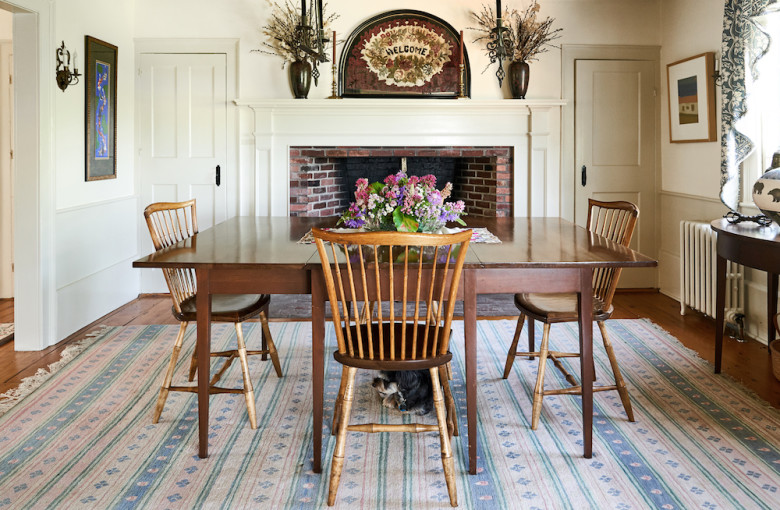
Photo Credit : Mark Fleming
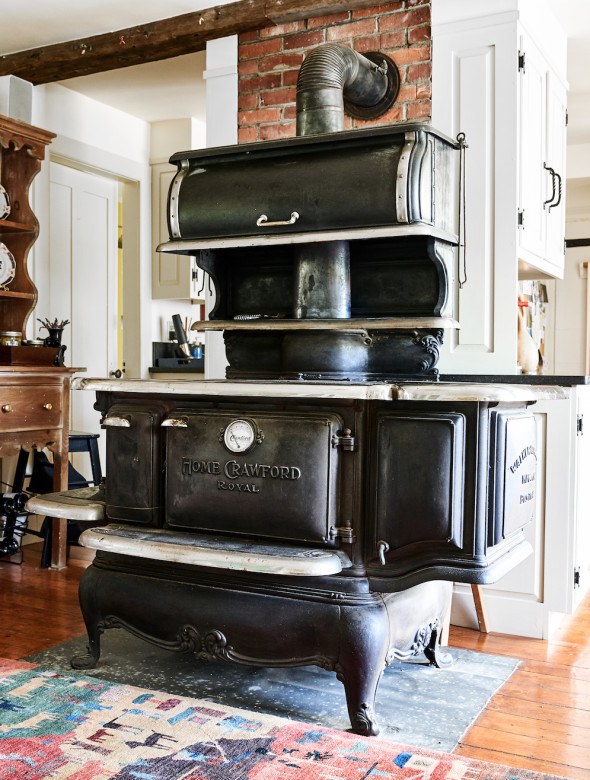
Photo Credit : Mark Fleming
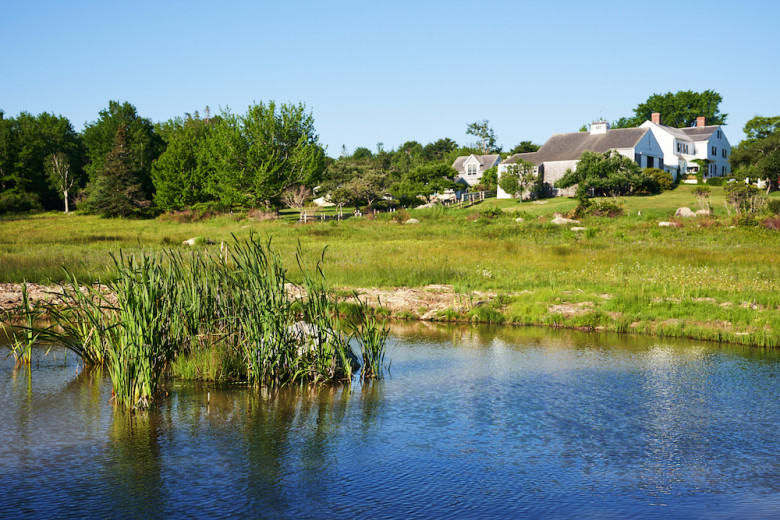
Photo Credit : Mark Fleming

Photo Credit : Mark Fleming
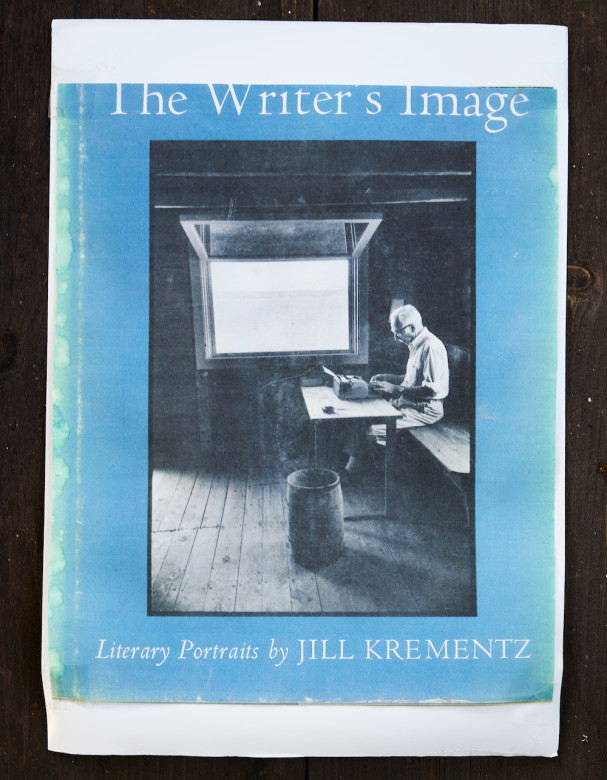
Photo Credit : Mark Fleming
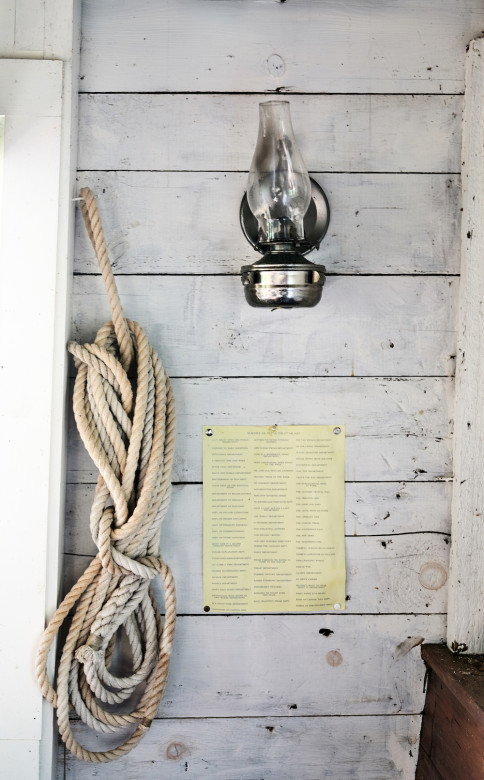
Photo Credit : Mark Fleming





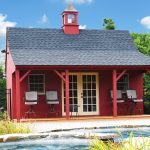
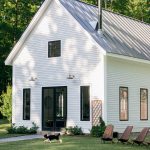

Love the article…always a New Englander at heart…love the home…it will be a dream for someone new!
Oh the history and stories, absolutely breathtaking!
What a creative spiritual space. Joy….silence..fun joy..appreciation of life…. And productive life..writers of all dreams , visions..Awareness of you gifts and benefits of that kind of atmosphere. Confidence , courage and strenght
I am Henry’s youngest daughter and spend many, many hours at this house with my father and grandmother. This article brought back great memories. Our family was touched forever to have been employed by EB White.
Marianne, oh my what wonderful conversations you must have! I love the way E. B. White thought and communicated his thoughts. I have this quote at the bottom of my business email: ”I would feel more optimistic about a bright future for man if he spent less time proving that he can outwit Nature and more time tasting her sweetness and respecting her seniority.” ~ E. B. White
Love that hooked rug that was commissioned. It would be appropriate to honor the maker of that work of art by stating her/his name.
Loved this story. Henry the care taker was my Uncle. I have several of Mr. White’s books autographed; a perk of having a relative working for the famous writer!
I bet I could write beautifully if I lived in a setting like that. Amazing.
Now, if I could only arrange for my husband to win the lottery.
Truely wonderful and inspiring.
As a children’s book author, there is no body of work that I admire more than that of E. B. White. His three books for young readers are displayed on my oak writing table as inspiration. I loved this article and the gorgeous photos. Wouldn’t the farm make an exquisite writers’ retreat? If only . . .
What a beautiful — and beautifully kept — property! It must have been close to 30 years ago that we stopped to visit friends who had moved to Blue Hill from NH after partially retiring from teaching music. “Wilbur’s house” had been moved to their property, so we enjoyed seeing that and taking a picture of our daughter beside it.
Such a wonderful story. Thank you. I was born and brought up in Maine and it has been such a pleasure to read this article about E.B. White and the Gallants. I know Charlotte and Wilber will never leave that special place and to me that is a peaceful thought. Thank you.
I was fortunate to have lived next door to Joel White and his wife. Joel was a good man. Down to earth. My kids went to school with his grandkids. Stories about EB and his antics lived on in Brooklin. EB’s house was just up the road. It’s a great place and I am absolutely sure the old guy’s spirit lives on in those rooms and on that land.
My grandfather’s name is Henry who is mentioned in this article. I remember spending time at EB Whites house as a child. Such a beautiful article. We will miss the Gallants.
The Gallants are some of the most gracious and deserving people of caretaking such a beautiful and historic place. Folks in our hometown are proud of the Gallants for their contributions and generosity to the community. And it appears they have have been great stewards for the beautiful state of Maine as well.
Truly a heartwarming article on the history of EBWhite and Katherine White’s beautiful farm, barns, and fields. 25 years ago, my husband and I made a trip to Brooklin, specifically to see the home of Charlotte, Wilbur, and the gang!! We were not disappointed!! I had been corresponding with Roy Barrette, and enjoying his articles in the local paper! A truly delightful man and an encouraging correspondent to my “hopeful” stories that I was dreaming of writing!! Perhaps a visit back to the farm would be appropriate for our 60th wedding anniversary….when the weather cools down, and Maine is at its finest, especially on the coast of Brooklin!!
I hope whoever is fortunate enough to become the new owner(s) of this property will honor the memory of E.B. White in the same way its current owners have and that more generations of area children will be able to hear the story of Fern, Wilbur, Charlotte, Templeton and all the rest in the very place that inspired that story.
Thanks for sharing the wonderful story, what an idyllic place, Jan vestal
I can’t help but feel badly for the adult grandson who is pleading they hold off selling the farm until he can afford it himself. If it is a financial issue that it must be sold, perhaps the property can be rented out in the meantime. It seems contrary to the farm’s history (not to mention outside the spirit of White’s request) to excise it from the family, when one of its members, who surely has many fond childhood memories of the place, is directly asking his grandparents to preserve it until he is in a position to make future memories for his own family. Obviously I don’t know the particulars of the situation; I just empathize with the powerlessness he must feel to see this part of his history being sold off before he can meet its hefty price tag. Any buyer will appreciate this one-of-a-kind farm, but none will share the grandson’s memories.
I agree, Darla, perhaps a fund should be set up for the Grandson to have it held for him until he can pay for it.
I agree!!!
I know exactly how he feels; when I was 17, my great-grandmother sold the farm her parents homesteaded in the 1870s. I practically grew up there, and it broke my heart to see it go, especially to people who allowed it to fall into ruin. At this price range it isn’t likely that the White/Gallant farm will be let go, but it would be a good thing if they could find some way to keep it in the family for future generations.
Maybe if they don’t need the money, this house wouldn’t be so much if they sold it to the grandson. Would be nice to keep it in the family or leave it to the family in their will. I myself would die to have it as a summer place but not in this lifetime could I ever afford something like this. But Charlotte will live there forever.
I remember reading Charlotte’s Web in the third grade.Spiders scare me to death but any spiders in my Grandpa’s huge three story barn are all “Charlottes” and therefore not scary. At a time in my life to downsize from my little “farm”, I read this beautiful article and thought, that’s for me! But of course it’s out of the question for so many reasons. So sad that the grandson can’t have it. ” If wishes were horses beggars would ride”. Thanks for a lovely read.
What I would give to just spend a day on this farm! I’m a retired third grade teacher and read this story over and over again to each classroom filled with my students….and each year I still got choked up when Charlotte died. I also wrote and performed with my 3rd graders a musical version of Charloite’s Web! In my home now I am creating a Charlotte’s Web bedroom for my grandchildren complete with two vintage barn doors, and a piece of barn wood that says ‘salutations ‘!!! This story has always been near and dear to my heart! ❤️
Anyone who has been to Maine knows it’s a place of the heart, unlike anywhere else. Seal Harbor is where my earliest memories of summer are.
This is perfection. I can dream of spending days creating oil paintings of the barns, the home, the views……..Love the history, and Acadia is a favorite location of ours…One can dream. Hope the new owners retain it’s charm and honor it’s historical significance.
Such a wonderful article. My fiancé’s father grew up in Brooklin and he still has the house which serves as our summer ‘camp’. They spend many weekends there and we try as often as we can. It’s my favorite place to be. It’s such a beautiful area and everytime we go by EB Whites home, we slow our vehicle down to a crawl just to captivate the property’s beauty. Since we’ve been engaged, our dream has always been that if we could get married at any place in this world…our first choice would be on the grounds of EB White’s home. It’s just a peaceful and magical place where the stories come alive and what place is more beautiful than that?
This is a lovely, lovely article about Maine, about E.B. White, about the Gallants. That boathouse looks like a perfect place to write if there ever was one! Truly a special home and I’m so glad I can at least get to know about it through the powers of the Internet. Thank you for this incredible piece. <3
Deep gratitude to Robert and Mary Gallant for their loving stewardship of the Whites’ Brooklin homestead. Onward and upward…
Wonderful story. I do feel for the grandson. It upsets me that, unless I missed it, there is no mention of the wonderful illustrations of Garth Williams, which complemented Mr. White’s descriptive prose and made the farm and characters come alive!
I am Henry’s middle daughter. Scrolling through the pictures brings back many fond memories of times spent with Mr. and Mrs. White. Am very grateful to the Gallant’s for allowing myself, husband, daughter and granddaughter to walk through the barn, swing through the barn doors and to use their golf cart to ride down to the boathouse. It looked the same as did in years past. A beautiful home with beautiful surroundings.
How amazing it must have been as a child to be in such a magical place! I love the story of Charlotte’s Web and so do my children…what a wonderful childhood memory for you and your family 🙂
Please let me know if this property is still available I am in love with Charlotte’s Web and would be so happy to find out more about purchasing it .
I now have a good reason to buy a lottery ticket. I would buy the property in a heart-beat. Always have been a fan of E.B. White. Loved reading this piece. Thank you.
This should sell in a snap, no? It is everything.
The stove cooks really good. A nice way to eat.
What a beautiful home! That cook stove just pulled at my heart strings. The setting is simply breath taking. I read Charlotte’s Web every year with my students and it’s so nice to see “the original”. Thank you for sharing it with us!!
I am thankful that I got to experience this piece of history though this article. I’m a southerner and thought I would always be, until I read this piece. Beautiful!
As a child and teenager, I spent my summers with my grandmother in our family homestead of 165 years, just up Bay Road from this beautiful place. I remember riding by, and someone always noting who lived there. The area has a special place in my heart. Our little farmhouse was boarded up and in probate for a decade, but we were able to purchase it, and we are in the process of restoring it for our family. I have been living in Southern California for 40 years, returning to my beautiful New England as often as possible. I loved your references to the area, and while fields have become woods and some childhood landmarks have changed or disappeared, it is my joy and peace. I love that the Gallants have cherished this farm and Mr. White’s memory. I will be in North Brooklin more often, and as I ride by this farm, and I will take joy at it’s beauty and heritage. Thank you for this article.
how nostalgic. Love all Mr.White’s works. A special name.
I worked at Gallent Belk (changed to Belk) for 26 years. So enjoyed reading this article I read it twice. Didn’t know this story. Would love to be able to visit. Love historical places. I too wish the Grandson could get the place.
thanks
Brooklin is a remarkable place. Visiting there is like going back to the America I knew in the early 50s. I you ever go, you must visit its lovely little library. Understand White’s home sold recently.
It’s early Saturday morning, Valentine’s Day. I’m sitting in the peaceful quiet, 6 am, reading this entire article plus the comments. Every descriptive fills my to as though I was there. I feel a sweet peace, an early Valentine’s gift. Thank you all for this article & the comments.
I read this story when it was first printed in 2017, Charlottes Web of course is every ones favorite book, I wondered who was the lucky one that purchased the farm, it certainly is a wonderful place to dream about.
My favorite is Stuart Little
Stuart Little is my favorite too!
I miss home (Me. and NH.) so much, I have tears in my eyes. I hope whoever is lucky enough to buy this beautiful place, it will be treasured by them. My grandparents had a small farm in ME and when they passed it was sold to some one who has let it go to ruin. It breaks my heart.
Lovely place. Shows the best of Maine. Would love to live there, the place where Charlottes Web was written.
Only just reread this evocative piece. We do realize how fortunate we are to have retired on a cove in Cape Rosier with a 60a. woodlot a couple of decades ago. E.B. and cruising Downeast were the muse for the move. The Deer Isle/Blue Hill penninsula have changed only some since E.B. Lucky.
I visited this property on a garden tour decades ago. 1984 I think, Absolutely gorgeous garden and setting.
When I was in my 20s, some forty years ago, I used to write letters to Mr. White, addressed to him simply at “North Brooklin, Maine. They always got there. He always wrote back. And I always wished I could see his farm in person. I have made many trips to Maine since then, but of course never got to visit the house at Allen Cove. Yet I feel, now, that I almost have seen it myself. Thank you for this lovely story and for the gorgeous photographs. The Gallants were indeed great stewards of a treasured place, and I know Andy White would be eternally grateful for that.
What a memory. All of my families love his work. Translated into Chinese, but still, witty, beautiful, elegant, and a bit melancholy